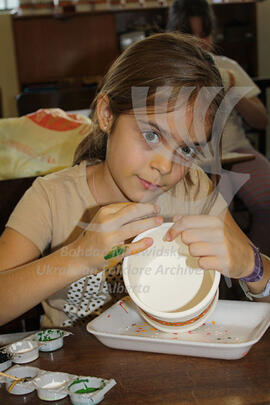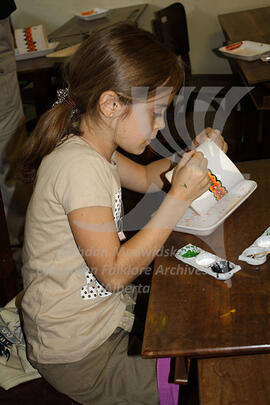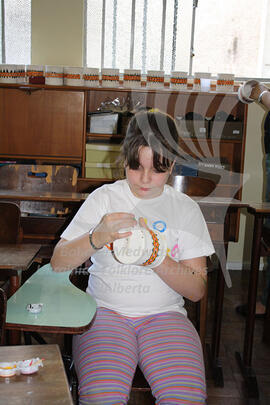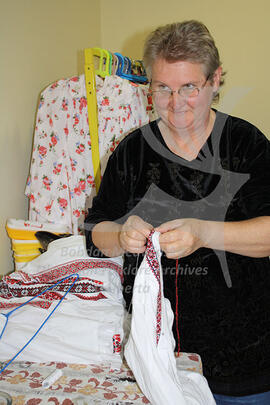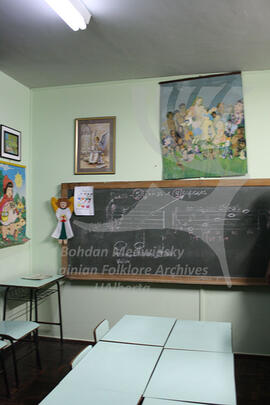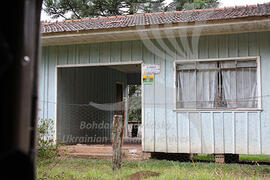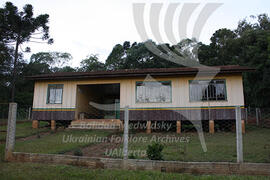The girl is painting Ukrainian ornament on the cup
The girl is painting Ukrainian ornament on the cup
The girl is painting Ukrainian ornament on the cup
The woman from Ukrainian community takes care of Ukrainian stage costumes
The classroom for teaching music in "Poltava" club
This item contains an interview with Mrs. Gauss, who was born in 1898, her maiden name was Zeider (Cyder?). Her mother originally
came from Württemberg. Her family was working on the land, were not rich. There were the only Germans in their village besides one shepherd. There was also a Lutheran church and a German school (education lasted 7 years). Children started going to school when they became seven years old. At the age of fifteen there usually was a confirmation and then they were working for their father until they got married and created own family. Her village was in the Melitopol district and there was a school in Eichenfeld. In general there were 32 family entities in the village each of them were farming and producing goods. Collectivization started in 1917-1918. The relationship with Russian people was good. There usually were many seasonal Russian workers in the German village. German children learned German and Russian languages in the school. Most of the Russian language they learned from Russian workers. Not many girls extended their school education as mothers needed them at home for help. There were eight children in her family, some families had ten, some six. Russians usually were very poor, had many children and not much land. Pomeschiki had more land. Mrs Gauss remembers how people once all together bought land from pomeschik and created a village. Germans were forced to go to the Russian army as well. Tsar Nicolai was loved by Germans. There was a school which educated doctors as well. She was 16 years old when the war started, Germans were forced to join the Russian army, many were captured in Germany and afterwards returned back to Russia. Her village didn´t have problems during the war, they had a cooperative and the living was good. She visited Krym once many years later. Memories on her village during the revolution. People came from Moscow, took what they wanted and went further to other villages.
This item is an interview with Lydia Wagner, conducted by Veronica Whitfield in Calgary, AB in May of 1981. Mrs. Wagner talks about becoming naturalized in Germany after Hitler’s troops had invaded. She got married in 1950 in Freiburg and in June 1952 they moved to Canada. Five years later they became Canadian citizen. Mrs. Wagner talks about school in Russia. Students had been supported well by the government.
She was born in Karlsruhe. Her uncle worked as a teacher then he got arrested and tortured to death. Her father and her (other) uncle had been persecuted when communism begun. Her uncle was the first family member who moved to Canada (Saskatchewan).
Her father was displaced in 1929. After the expropriation of the family and deportation of her father she, her mother and sisters flew to Siberia. Her mother worked and the children went to a German school. They lived in Slavgorod. Two years later the family moved to Landau. Mrs. Wagner talks about her great-grandfather who is supposed to be the first emigrant of the family.
Talks about her sisters and brothers in detail:
-her oldest sister: Felomena and her husband Karl Szaray (Munich) live in California;
-another sister: Rosa, died 17 years ago, was married to John Marin (Canadian) had two sons;
-another sister: Ida Anto died in a car accident, her husband was John Anto, she had one daughter;
-Mrs Wagner herself: her name is Lydia and she is married to John Wagner
-Regina Steve Marin (brother of John Marin) lived first Calgary then in Kelowna
-Elvira Carl, lives in Kelowna, has two daughters
Her Father was sentenced for 10 years prison but came back to Landau after 8 years and worked as a groom. After one year he was displaced again. When German troops invaded (1940) they lived in Nikolai (today Mikołów). In 1943, They moved to Czechoslovakia and then to Voralberg near Bregenz in Austria. They lived in Germany until 1950 where Mrs. Wagner met her later husband and got married.
In March 1952 her mother moved to Calgary and in June Mrs.Wagner came to Calgary.
At their beginning in Canada they borrowed money from her uncle because her husband could not find a job as a cook. They lived in the area outside of the city without water and electricity. After having built their own house, her husband became self-employed and started building houses for other people, for 20 years.
Talking about church.
Village school in Barracas "Escola rural municipal de Barracas".
Elementary school in Barracas neigborhood.
This item contains two interviews with unknown females. The first interviewee was born in Russia in 1909. She talks about the place where she lived and family members that were starving and being deported to Siberia. She then talks about coming to Canada and what she and her husband did in Canada. She talks about the church and being Lutheran and Evangelic.
The second interviewee's parents came from Poland and she was raised in a Lutheran family. Her family left to Ukraine and then came to Canada in 1927 and moved to Alberta in 1928.
The tape also contains music recordings
